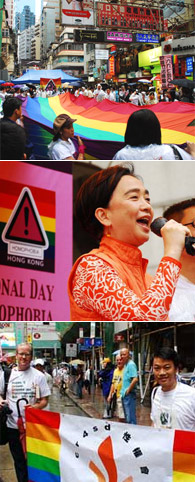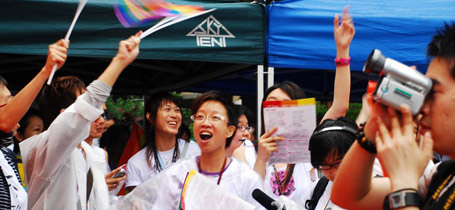"From 1997 to 2007, just a piece of tangerine."

Top of page: lesbian activist and organiser Connie Chan of the Women's Coalition; above: Legislative Council (Legco) member Emily Lau (middle pic) and Roddy Shaw (right) and Bill of Civil Rights for Sexual Diversities. Click on the links below for more images.
In Cantonese, it rhymes. A seasonal fruit, tangerines are to the Lunar New Year as chestnuts are to Christmas. Tangy and sometimes sour, it can give one a sting in the mouth. When one says "A tangerine is all I got from it," it means he or she had made an effort for nothing.
In 1998, the Hong Kong Government proposed an all-inclusive anti-discrimination legislation bill. It was stalled due to a petition initiated by the Society of Truth and Light, a conservative Christian organisation, according to Connie Chan of the Women's Coalition.
Consider this scenario. Fifty people sit in an air-conditioned room, two of which complain of a cold, but forty-eight others think that the temperature is fine. Should the airconditioning be turned down just for the plight of these two?
"First of all, homosexuality is not a sickness like a cold," said Chan in a phone interview. "The WHO had already declared that. If it was a disease, I'd tell my boss tomorrow: 'I'm gay, I need sick leave.'"
She added that discrimination really is no good for the integrity of the society as a whole, and legislation against discrimination would lead to the betterment of the entire city, not just the minorities.
Chan, who is one of the organisers of IDAHO, had recently written in a column on inmediahk.net (in Chinese, link provided at the end of this article) about the history of discrimination in Hong Kong. The 33-year-old outspoken activist, feels that IDAHO is essentially a sad event, commemorating the removal of homosexuality from the list of mental disorders at the World Health Organization on 17 May, 1990.
It isn't Mardi Gras. It is supposed to be a sad event more akin to a funeral march than, uh, a gay pride parade. Especially when it occurred under the black rainstorm signal last year. One could hold an umbrella and literally be completely soaked in less than a minute. Still, nearly 400 people showed up.
This year, the rain was a little softer, and the day a little brighter. Some 600 participants gathered at the East Point Road pedestrian zone in Causeway Bay, one of the busiest sections of the business district, at 3pm to begin warming up for the much longer walk this year.
The congregation walked from Causeway Bay to Central, occupying one traffic lane on the main artery along Hong Kong Island, with double-decker buses zooming by inches away. Police offices lined up along the way while thousands of onlookers stopped in their tracks.
The coalition of 17 organisations that put this together include Horizon, Ziteng, Amnesty International, Spiritual Seekers Society and AIDS Concern, a diverse collection of groups concerning sexual minorities, religion and human rights.
In two months leading to the march, the coalition raised approximately 40,000 Hong Kong dollars (approx. US$5,130) through gay and lesbian bars, street teams, and donation boxes during the march. The entire sum of money went into funding the event, but the organisers managed to maintain a balanced budget.
The march ended at the Chater Garden pedestrian zone, the crowd gathering in front of a stage for a closing ceremony.
Senior Instructor Dr Chan Sze Chi from the Hong Kong Baptist University Department of Religion and Philosophy addressed the crowd and advocated tolerance among members of the religious community. He pointed out how extremely few leaders among the religious community stood out to support equal rights for sexual minorities.
Dr Chan urged religious people to pray for the enlightenment of those who do not understand or do not sympathise with the plight of these minorities. He also stressed the importance of teaching the children, promoting understanding and tolerance in education, from the bottom up.
Legislative Council (Legco) member Emily Lau who had marched in the parade last year spoke at the closing ceremony this year.
Lau urged for the gay community to continue fighting for equal rights despite opposition from anti-gay quarters and the delay by the Hong Kong Government to pass anti-discrimination laws and equal rights for same sex couples.
Chan said she was happy to see increased attendance. Noticing the participation of more Southeast Asians this year, she attributed it to the increased promotional effort of the coalition.
"We approached the community organisations of these minorities," referring to the scores of Filipino or Indonesian lesbians, mostly domestic helpers, who turn up in great numbers on Sundays at Victoria Park in Causeway Bay and the Chater Garden pedestrian area in Central. Both are highly populated business districts.
The parade was also advertised in gay and lesbian publications in the Chinese mainland. An estimated 50 mainland activists and participants are believed to have come for the event as many have never been in a public protest or rally given the strict rules in China.
What about a gay pride parade? Really, can it happen in Hong Kong?
"Gay pride means being proud of one's sexual identity," said Chan. "But IDAHO commemorates a historical event, and the two have a fundamental difference in nature."
She mentioned the challenges of organising a gay pride parade in Hong Kong. First of all, who would organise it? Secondly, where is the money? And lastly, who is willing to come out and tell the world they're proud they're gay?
Horizon had once organised a gay pride parade around Lan Kwai Fong, the bar and restaurant area in the Central business district.
"Homophobia is a reality in Hong Kong," said Chan. "Not everyone is lucky enough to come out like I do. In fact, my mother, my boss and colleagues all came out to march with me."
Towards the end of the closing ceremony, the two veteran broadcasters who hosted the ceremony asked the crowd to make one minute of noise rather than maintain a minute of silence as they did last year.
Who knows, maybe IDAHO can really turn into a happy event. This year's theme song was Denise Ho's Brightness Club, an upbeat dance song urging the community to come together and make a change.
After all, the word "gay" means "happy" in its origin. Happy vibes attract happy people, and there is strength in joy.












 列印版本
列印版本










讀者回應
I am and will go on working in some way for the gay cause. Let's unite and create a better future for gays in the territory!
請先登入再使用此功能。